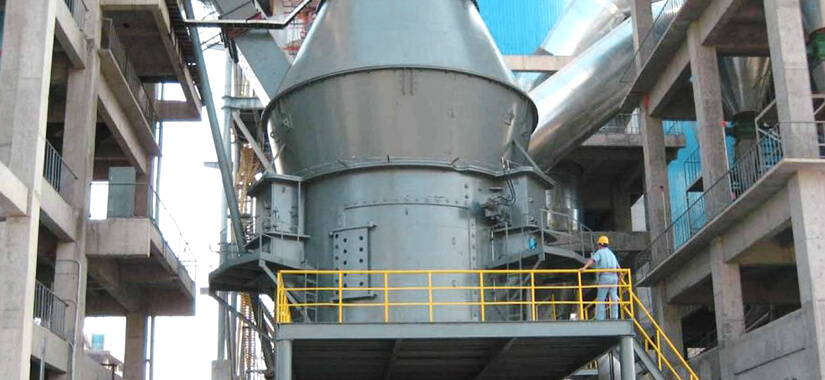
Milling raw material in the cement industry refers to the process of grinding raw materials such as limestone, clay, sand, and other minerals into a fine powder called raw meal. This step is crucial in cement production because this raw meal will be further processed by adding additional materials like gypsum to produce a mixture called clinker through a burning process.
The goal of milling is to produce particle sizes that are uniform and meet the specifications required in clinker production, ensuring the quality and consistency of the final cement product.
This process uses various types of equipment, such as ball mills, roller mills, or vertical mills, which operate on the principle of grinding and crushing to achieve the desired results before the next process in cement manufacturing.
Problems of milling raw materials in the cement industry and their solutions include:
1. Problem: High-Temperature Grease
The issue of high-temperature grease in milling raw material in the cement industry involves the challenge of selecting grease that can withstand the high temperatures generated by milling equipment such as ball mills, roller mills, or vertical mills.
In these intensive operational conditions, high temperatures can cause the grease to become more fluid or flow, reducing its ability to lubricate effectively.
Solution: Molykote / Dow / LE
Molykote, Dow, and Lubrication Engineers (LE) can be effective solutions for the high-temperature grease issue in milling raw material in the cement industry because they offer grease products specifically designed to handle extreme temperatures and heavy operational conditions.
These products have formulations that can maintain viscosity stability and lubrication performance at high temperatures, as well as offer good protection against corrosion and oxidation. By using the right grease from these brands, companies can reduce the risk of equipment damage in the milling process, thereby increasing operational efficiency and extending the service life of the equipment.
2. Problem: Motor Cleaner for Gearbox
The issue of motor cleaner for the gearbox in milling raw material in the cement industry involves the need to maintain cleanliness and optimal performance of gearbox components involved in the grinding process of raw materials such as limestone and clay.
Dust and fine particles from the raw materials can accumulate around the gearbox, disrupting internal functions such as bearings and gears. This can lead to increased friction, faster wear, and even mechanical failure if not properly addressed.
Solution: EonMotor 100
EonMotor 100 can be an effective solution for the motor cleaner issue for the gearbox in milling raw material in the cement industry because its special formulation is designed to clean and protect machine components from the accumulation of dust and raw material particles such as limestone and clay.
Its formula contains a blend of solvents specifically designed to clean electric motors and dynamo from oil and grease contaminants. This product is highly effective in removing contaminants, ensuring components remain clean and function optimally.
Please contact us for more information.
3. Problem: Road Dust
The issue of road dust in milling raw material in the cement industry involves controlling the dust generated by transportation and grinding activities of raw materials such as limestone and clay.
Dispersed dust can cause various problems, including visibility issues, health risks for workers, and potential equipment damage. Additionally, uncontrolled dust can spread to the surrounding environment, polluting the air and causing complaints from the local community.
Solution: DustDown 369, CSS
DustDown 369 and CSS can be effective solutions for the road dust issue in milling raw material in the cement industry because they are designed to control and suppress the dust generated by transportation and grinding activities.
DustDown 369 is an effective dust suppressant that can be applied to roads to bind dust particles, preventing them from flying and spreading. CSS (Chemical Stabilizing Solution) works by stabilizing the road surface, reducing abrasion and dust formation caused by heavy vehicle movement and wind.
Please chat with us on WhatsApp for further discussion.
4. Problem: Grease Quality
The issue of grease quality in milling raw material in the cement industry relates to the challenge of ensuring that the grease used can withstand harsh and heavy operational conditions. Milling equipment such as ball mills, roller mills, and vertical mills generate high temperatures and extreme pressure, which can lead to faster grease degradation.
Low-quality grease or grease that does not meet these specifications can result in inadequate lubrication, increased friction, and wear on critical components such as bearings and gears.
Solution: Molykote / Dow / LE
Molykote and Lubrication Engineers (LE) can be effective solutions for the grease issue in quarrying limestone in the cement industry because both offer grease products specifically designed for harsh environments and heavy applications.
These products contain formulas that can handle high pressure, extreme temperatures, and contamination from dust and limestone particles, thus ensuring optimal performance of machinery and equipment.
Please contact us on WhatsApp for more details or to consult.
5. Problem: Floor (Slippery and Damaged)
The issue of slippery and damaged floors in milling raw material in the cement industry involves significant risks to worker safety and operational efficiency. Grinding and transporting raw materials such as limestone and clay often result in material spills, oil, and water, making the floor slippery and hazardous for workers walking or operating machines in the area.
Additionally, the heavy loads from milling equipment and moving vehicles can cause structural damage to the floor, such as cracks and wear. Poor floor conditions can increase the risk of workplace accidents and hinder operational activities.
Solution: EonCoat 551 / EonCoat 470
EonCoat 551 and EonCoat 470 can be effective solutions for the slippery and damaged floor issue in the crushing limestone area in the cement industry because both are protective coatings specifically designed to enhance safety and extend the life of the floor.
These products offer long-lasting protection against abrasion, chemicals, and heavy pressure from equipment and materials moving over them. By applying EonCoat 551 or EonCoat 470, the floor surface can be made rougher to prevent slipping and reduce the risk of slippage.
6. Problem: Water Treatment
The issue of water treatment in milling raw material in the cement industry encompasses the challenges of managing the water used in various production processes, such as cooling and cleaning. The water used is often contaminated by fine particles from raw materials, such as limestone and clay, as well as chemical residues from the grinding process.
This contamination can cause blockages in piping systems and equipment, reduce cooling efficiency, and increase the risk of corrosion and damage to machinery.
Solution: Flocculants and Coagulants
Flocculants and coagulants can be effective solutions for the water treatment issue in milling raw material in the cement industry because these chemicals work by aggregating and settling fine particles and contaminants in the water.
Coagulants help bind small particles into larger ones, while flocculants then gather the coagulated particles into larger flocs that can easily settle.
By using flocculants and coagulants, water contaminated by raw materials such as limestone and clay can be treated more efficiently, reducing blockages in piping systems and equipment, improving cooling efficiency, and preventing corrosion and damage to machinery.
7. Problem: Boiler
The issue of boilers in milling raw material in the cement industry involves the challenge of maintaining optimal performance and operational reliability of boilers used to provide steam or heat in the production process. Boilers often face problems such as scale formation, corrosion, and fouling due to improperly treated feedwater or contamination by fine particles from raw materials such as limestone and clay.
Scale formation and corrosion can reduce heat transfer efficiency, increase fuel consumption, and cause damage to boiler components. Fouling, or the buildup of deposits on heating surfaces, can also hinder heat flow and decrease boiler efficiency.
Solution: Eon Boiler Chemicals
Eon Boiler Chemicals are an effective solution package for boiler issues in milling raw material in the cement industry. These products are specifically designed to address problems of scale formation, corrosion, and fouling.
The Eon Boiler Chemicals solution package has formulations that can condition boiler feedwater, prevent scale formation by binding scale-causing minerals so they remain dissolved in the water.
Please consult with our team for details on boiler solution products, including dosage and application methods.
8. Problem: Cooling Tower
The issue of cooling towers in milling raw material in the cement industry involves the challenge of maintaining optimal cooling efficiency in the production process. Cooling towers are used to dissipate heat generated by equipment such as ball mills, roller mills, and vertical mills, which often produce high temperatures during the raw material grinding process.
Common issues include scale formation, rust, and algae on tower surfaces, as well as mineral buildup and deposits from the water used for cooling. This can reduce heat transfer efficiency, increase water consumption, and affect the quality of the recirculated water used in the process.
Solution: Eon Cooling Tower Chemicals
Eon Cooling Tower Chemicals, such as EonBac GEO 9910, EonLine AG 5770, and EonScale T 2511, are effective solutions for cooling tower issues in milling raw material in the cement industry because these products are specifically designed to address various issues related to cooling efficiency and water quality.
| Read about grinding process problems and solutions
Please chat with our team on WhatsApp for more information.
Consult with EON Now
We are ready to listen and provide the right chemical solution for you. Consultation with our experts is free!

 Home
Home